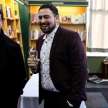No Offence, Benedict Cumberbatch
A chapter from my book, 'What Does He Dream About? (Stories and Observations from the Life and Death of my Brother with Autism)'

Pop-culture glorifies the autism spectrum disorder. In mainstream media, it’s as if autism is merely a socially awkward disorder compensated for by gifted genius. Think Dustin Hoffman in Rain Man, Sheldon Cooper in The Big Bang Theory, and Benedict Cumberbatch in everything. Admittedly, Rain Man is a good movie and The Big Bang Theory is my favourite guilty pleasure—not ashamed… okay, a little ashamed—but autism is grossly misrepresented in these depictions, at least in my experience.
I understand that autism is a spectrum, like Ke$ha songs—a spectrum of lovable, brilliant songs and equally lovable but less comprehensible songs.
And I also understand that there’s little representation in the media for my brother’s brand of autism. He was barely verbal, barely potty trained, but barely boring. He had a distinctly endearing personality. He was the darkest night and the brightest day in my life. Hopefully the stories in this book will ground you in what autism can look like when it doesn’t look like Benedict Cumberbatch.
So, here’s the plan, the mission. I am going to share with you some of the stories that my subconscious decided to tack onto its corkboard of memories. Stories about two brothers growing up in the same house, living with the same parents, and going to the same Jewish day school. Stories about two brothers who lived the same life, but experienced entirely different ones.
Hopefully these stories can also provide a sense of comfort to those who are dealing with or have dealt with a similar situation. I want you to know you are far from unaccompanied. This isn’t a solo gig.
When I was younger, my dad brought home a book written by the sister of a boy with autism. Although I don’t actually remember much of what it said, that book was my first engagement with the very idea that there were other people in my position out there in the world. The sibling; the inadvertent passenger.
I hope this book can be for you what that book was for me.
And there’s something else I want you to know. I don’t read much.
That was hard for me to admit just now.
I mean, how is a 21-year-old, emotionally immature, self-proclaimed king of the procrastinators, who doesn’t read much, going to pull off writing a book? If I don’t read much, then why are my words worthy of being cradled in your palms? Or are they? I guess you and me are going to find out together.
What’s that? It’s ‘you and I’? Got it; we can make this work.
I’m not sure why I don’t read much, especially given my parents are voracious readers. I have countless childhood memories of their loving faces obstructed by books. And there’s always been an unspoken, and occasionally spoken, tension in my house over the fact that I don’t read much.
Which brings me to three theories as to why the only book I’ve read cover to cover is The Fault in Our Stars. And yes, I cried. That was also hard for me to admit.
Theory one:
I’m a child and a product of the internet. I grew up in a world without boredom, which sounds great initially, but I’m worried. I’m worried that access to constant, fast-moving, colourful, and mindless images at a young age corrupted my mind, and the minds of an entire generation. It makes sense that the literal thought of picking up a book gives me clammy hands when my entire life has been a series of YouTube videos and GIFs, which is pronounced with a soft ‘g’—and you can fight me on that.
But, of course, there are countless people my age who love reading, and who have read more books than I can even name.
Theory two:
I was never taught how to read.
I mean, in the sense of actually reading something. Sure, I’m literate. I can read words and associate them with their meaning. I can even read several words strung together and understand what they are saying. But the actual act of reading is a very different skill altogether. Perhaps a skill I was never effectively taught in school.
But, of course, there are countless people my age who experienced the same school curriculums as me and graduated in the same year as me who have read more books than I’ve ever heard of.
Theory three:
I’m not good.
This is my least favourite theory of the three. In this theory, it’s all on me. In this theory, I actually have to take ownership for my faults.
In this theory, I’m undisciplined. I’m lazy. I’m stupid. I’d rather drain hours on social media, filling my brain with toxic waste, than pick up a book and read one damn page of value. Something that would enhance my human experience. Something that would feed my brain healthy fuel, rather than the junk it’s used to.
I don’t like this theory. In this theory, I’m junk.
Which theory do you agree with most? Whisper your answer into the crease of this book, or text 555-dead-brother.
Anyway, when the reality of the book writing process pierced me in the chest like Darth Vader’s lightsaber into Obi-Wan’s, I decided to buy some books. Logically, if I’m writing a book, I should try to see what this book thing is all about. To write well, you must read. It only makes sense.
I had a specific tone in mind for what I wanted this book to be, so I bought books that I thought would help inform that tone. Books like Yes, Please by Amy Poehler, Furiously Happy by Jenny Lawson, and The Physics of the Manhattan Project by Bruce Cameron Reed. That last one was an accident; I returned it immediately.
I zeroed in on funny books written by funny people that also tackled heavier topics. Even though this book, my book, puts pain and sadness there on the plate in front of you, I hope it also puts a thirst-quenching glass of humour right next to it. Comedy is the reason I can survive never seeing my little brother again. Comedy is the bottle of water in my slow, dry walk through the desert.
I also wanted to be able to share a few smart things in this book—information about autism and associated behaviours and current research—as eloquently and appropriately as my communications degree would allow. My parents were usually the source of those smart things, which were either told to them by experts or learned through their own experience as our lives with Nathan rolled along. I consider myself merely the conduit of those things, as well as some tidbits gathered through my own research—all from online sources, of course.
Before taking on this project, it was important to me to learn from writers who can balance humour and gravity, which is why it’s great that I never actually read any of those books. Classic me. I read eleven pages of Yes, Please, fourteen pages of Furiously Happy, and zero pages of The Physics of the Manhattan Project. I probably could’ve read all those books in the time I wasted—misused?—watching C-list celebrities’ Instagram stories. Drake Bell has some good ones, like when he flexes his Gucci socks on us, or stares into his camera for fifteen seconds.
But this book isn’t about staring into Drake Bell’s eyes fifteen seconds at a time. It’s about growing up with a little brother with autism spectrum disorder. It’s about the different races we all run, and how because of those races, we’re each shaped in individual ways. Living with my brother was a long and tiring race, but losing him has been even harder. It’s a race with no finish line.
Growing up with Nathan moulded me. And I’m often reminded of how emotionally linked I am to him. You know when your brain sometimes decides to show you embarrassing memories just for fun? I have one that comes back to me a lot, and I try not to scream in public when it does. It’s from my Bar Mitzvah.
During your Bar or Bat Mitzvah, you have to give a speech to a crowd of peers, family, and friends of your parents that you barely know. Then, you read some Hebrew from the Torah and you become a man or a woman. My speech was pretty standard for an awkward Jewish thirteen-year-old. I thanked the rabbi, I thanked my mom, I thanked my dad.
Then I got to the part of the standard awkward Jewish thirteen-year-old speech where you’re supposed to talk about your siblings. Typically, you’d give the usual line about how even though you and your siblings may not always get along, you love them anyway.
That wasn’t how it happened for me. When I started talking about my brother, I got that feeling you get in the back of your eyes before you start crying uncontrollably. Then I started crying uncontrollably. As I cried and salivated all over the pages of my speech, I tried lumbering my way through the words on the pages that I wrote while sitting at my family’s desktop computer. And as the congregation of my peers, my family, and the friends of my parents that I barely knew stared at me, I lost my cool completely.
I lost my cool completely because I loved my brother to literal tears; and if ever I doubt that now, I remember moments like those, like the others in this book, where my feelings were completely evident. Our connection was never conventional. His level of severity on the autism spectrum made normal impossible, but that was normal to me.
Selfishly, this book also serves as my personal coping mechanism. In the moments after my brother stopped breathing, I cold-called 70 percent of my contact list to tell them what happened. I found that my natural instincts were telling me to talk, to talk to anyone who answered my impromptu phone calls starting around 1:40 on that Tuesday afternoon.
“Hey- I’m okay. Yeah- no, well, we decided to turn the respirators off. So, he’s- yeah, just now. I’m okay. Okay, talk to you soon. Bye.”
“Hey- I’m okay. We decided to turn the respirators off…”
This book is yet another phone call, and by reading it, you are answering.
Book summary
What is it like growing up with a brother who has autism? And what happens when he’s gone?
Jeremy Morantz recounts the tensions of living with his brother Nathan and then coping with the grief that came with Nathan’s unexpected death. Simultaneously heartbreaking and heartwarming, Morantz’s fresh and funny style gives you an engaging look into his experiences with his little brother. Morantz takes readers into the story of two brothers who grew up in the same house, lived with the same parents and went to the same Jewish day school—two brothers who lived the same lives but experienced entirely different ones.
Author bio
Jeremy Morantz is a 22-year-old Communications graduate with a focus in public relations and politics. Jeremy’s writing is influenced by his love for comedy, pop-culture, and top 40 music. What Does He Dream About? is his debut book. He lives in Winnipeg.








Comments
There are no comments for this story
Be the first to respond and start the conversation.